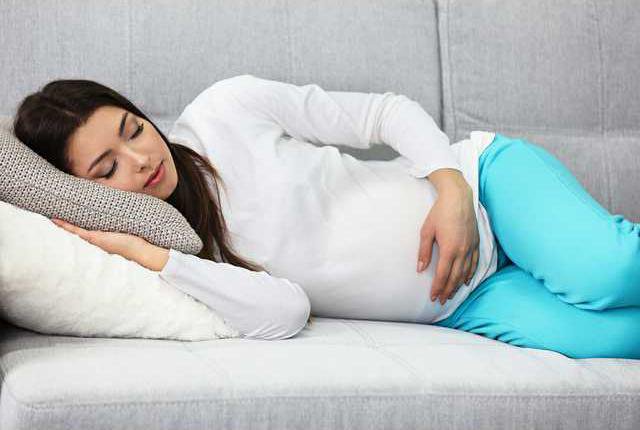The number of stillborn babies birthed is larger than you may think. One in 200 pregnancies in the United Kingdom and one in 160 pregnancies in the United States ends in stillbirth. In fact, a large percentage of these pregnancies were low-risk and had no complications, leaving doctors stunned as to the cause of death.
For this reason, researchers have decided to get to the bottom of the mystery in order to save lives. They've uncovered some interesting results.
It's all about the way you sleep
According to recent study by Tommy's Stillbirth Research Centre, researchers estimate that 130 babies could be saved by women changing this one sleeping habit. What do you need to do? Sleep on your side.
The study, published in British Journal of Obstetrics and Gynecology, confirmed what four smaller studies had also found: sleeping on the back is associated with term stillbirth.
The data was based on over 1,000 expecting mothers to learn about the sleeping habits of pregnant women and identify corresponding trends. Both women who delivered live and stillborn babies were interviewed. The results of the study showed that women who sleep on their backs during the third trimester have at least twice the risk of delivering a stillborn child as those who sleep on their left-hand side.
The researchers can't veritably say why back sleeping is connected to stillbirths. However, they hypothesize that laying on the back restricts blood flow to the baby because the weight of the baby and the womb puts pressure on the connecting blood vessels.
What should you do?
Don't be stressed out if you move around in your sleep and wake up on your back. Clinical director at Tommy's Stillbirth Research Centre, Professor Alexander Heazell, who led this study told the BBC,"What I don't want is for women to wake up flat on their back and think 'Oh my goodness I've done something awful to my baby.'
"The question that we asked was very specifically what position people went to sleep in and that's important as you spend longer in that position than you do in any other.
"And also you can't do anything about the position that you wake up in, but you can do something about the position you go to sleep."
How to start sleeping on your side:
While further research needs to be done to determine if changing the sleeping position to the side in the third trimester really can prevent stillbirth, you can still put this habit into practice to reduce your possible risk. Here are a few tips to help train your body to sleep on your side.
For this reason, researchers have decided to get to the bottom of the mystery in order to save lives. They've uncovered some interesting results.
It's all about the way you sleep
According to recent study by Tommy's Stillbirth Research Centre, researchers estimate that 130 babies could be saved by women changing this one sleeping habit. What do you need to do? Sleep on your side.
The study, published in British Journal of Obstetrics and Gynecology, confirmed what four smaller studies had also found: sleeping on the back is associated with term stillbirth.
The data was based on over 1,000 expecting mothers to learn about the sleeping habits of pregnant women and identify corresponding trends. Both women who delivered live and stillborn babies were interviewed. The results of the study showed that women who sleep on their backs during the third trimester have at least twice the risk of delivering a stillborn child as those who sleep on their left-hand side.
The researchers can't veritably say why back sleeping is connected to stillbirths. However, they hypothesize that laying on the back restricts blood flow to the baby because the weight of the baby and the womb puts pressure on the connecting blood vessels.
What should you do?
Don't be stressed out if you move around in your sleep and wake up on your back. Clinical director at Tommy's Stillbirth Research Centre, Professor Alexander Heazell, who led this study told the BBC,"What I don't want is for women to wake up flat on their back and think 'Oh my goodness I've done something awful to my baby.'
"The question that we asked was very specifically what position people went to sleep in and that's important as you spend longer in that position than you do in any other.
"And also you can't do anything about the position that you wake up in, but you can do something about the position you go to sleep."
How to start sleeping on your side:
While further research needs to be done to determine if changing the sleeping position to the side in the third trimester really can prevent stillbirth, you can still put this habit into practice to reduce your possible risk. Here are a few tips to help train your body to sleep on your side.
- Put a pillow behind your back to prevent movement
- Use pillows or rolled towels to keep your ear, shoulder and hips aligned
- Place a thin pillow between your knees to reduce stress on back and hips
- Sew a tennis ball in the back of your shirt to remind your body to stay on your side
- Sleep on a narrow sofa for a few weeks to train your body to break the habit
- If you wake up in the night, check your position and switch to your side
- Remember to sleep on your side when napping as well








